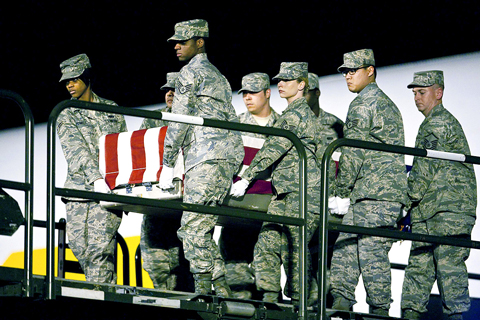Reporters witnessed and recorded a Sunday night ceremony for the arrival of a US airman killed in Afghanistan, marking the end of an 18-year ban on news coverage of returning US war dead.
After receiving permission from family members, the military opened Dover Air Force Base in Delaware to the media for the return of the body of Air Force staff sergeant Phillip Myers.
The 30-year-old airman was killed on Saturday near Helmand Province when he was hit with a blast from an improvised explosive device, the Department of Defense said.

PHOTO: REUTERS
Myers’ family was the first to be asked under a new Pentagon policy whether it wished to have media coverage of the arrival of a loved one at the Dover base mortuary, the entry point for service personnel killed overseas. The family agreed, but declined to be interviewed or photographed.
On a cool, clear night under the yellowish haze of floodlights on the tarmac, an eight-member team wearing white gloves and camouflage battle fatigues carried Myers’ body off of a military contract Boeing 747 that touched down at 9:19pm after a flight from Ramstein Air Base in Germany.
Myers’ widow and other family members, along with about two dozen members of the media, attended the solemn ceremony, which took about 20 minutes and was punctuated only by clicking of camera shutters and the salute orders of Colonel Dave Horton, operations group commander of Dover’s 436th Airlift Wing.
Horton presided over the ceremony along with Air Force civil engineer Major General Del Eulberg and Major Klavens Noel, a mortuary chaplain.
Noel and the other officers boarded the plane for a brief prayer before an automatic loader slowly lowered the flag-draped transfer case bearing Myers’ body about 6m to the tarmac, where the eight-member team slowly carried it to a white-paneled truck.
Preceded by a security vehicle with flashing blue and red lights, the truck then slowly made its way to the base mortuary, where Myers’ body will be processed for return to his family.
Myers was a member of the 48th Civil Engineer Squadron with the Royal Air Force in Lakenheath, England, one of the bases the US Air Force uses in the country. He was awarded a Bronze Star for bravery last year in recognition of his efforts in support of Operation Iraqi Freedom, the Department of Defense said.
Myers’ widow flew from England to attend the arrival of his body to the US, which marked the first time since 1991 that members of media were allowed to witness the return of a combat casualty to Dover.
The ban was put in place by former US president George H.W. Bush in 1991, at the time of the Gulf War. From the start, it was cast as a way to shield grieving families.
But critics argued the government was trying to hide the human cost of war. US President Barack Obama had asked for a review of the ban.
Under the new policy, families of fallen servicemen will decide whether to allow media coverage of their return. If several bodies arrive on the same flight, news coverage will be allowed only for those whose families have given permission.

Nauru has started selling passports to fund climate action, but is so far struggling to attract new citizens to the low-lying, largely barren island in the Pacific Ocean. Nauru, one of the world’s smallest nations, has a novel plan to fund its fight against climate change by selling so-called “Golden Passports.” Selling for US$105,000 each, Nauru plans to drum up more than US$5 million in the first year of the “climate resilience citizenship” program. Almost six months after the scheme opened in February, Nauru has so far approved just six applications — covering two families and four individuals. Despite the slow start —

North Korean troops have started removing propaganda loudspeakers used to blare unsettling noises along the border, South Korea’s military said on Saturday, days after Seoul’s new administration dismantled ones on its side of the frontier. The two countries had already halted propaganda broadcasts along the demilitarized zone, Seoul’s military said in June after the election of South Korean President Lee Jae-myung, who is seeking to ease tensions with Pyongyang. The South Korean Ministry of National Defense on Monday last week said it had begun removing loudspeakers from its side of the border as “a practical measure aimed at helping ease

MOGAMI-CLASS FRIGATES: The deal is a ‘big step toward elevating national security cooperation with Australia, which is our special strategic partner,’ a Japanese official said Australia is to upgrade its navy with 11 Mogami-class frigates built by Japan’s Mitsubishi Heavy Industries, Australian Minister for Defence Richard Marles said yesterday. Billed as Japan’s biggest defense export deal since World War II, Australia is to pay US$6 billion over the next 10 years to acquire the fleet of stealth frigates. Australia is in the midst of a major military restructure, bolstering its navy with long-range firepower in an effort to deter China. It is striving to expand its fleet of major warships from 11 to 26 over the next decade. “This is clearly the biggest defense-industry agreement that has ever

DEADLY TASTE TEST: Erin Patterson tried to kill her estranged husband three times, police said in one of the major claims not heard during her initial trial Australia’s recently convicted mushroom murderer also tried to poison her husband with bolognese pasta and chicken korma curry, according to testimony aired yesterday after a suppression order lapsed. Home cook Erin Patterson was found guilty last month of murdering her husband’s parents and elderly aunt in 2023, lacing their beef Wellington lunch with lethal death cap mushrooms. A series of potentially damning allegations about Patterson’s behavior in the lead-up to the meal were withheld from the jury to give the mother-of-two a fair trial. Supreme Court Justice Christopher Beale yesterday rejected an application to keep these allegations secret. Patterson tried to kill her